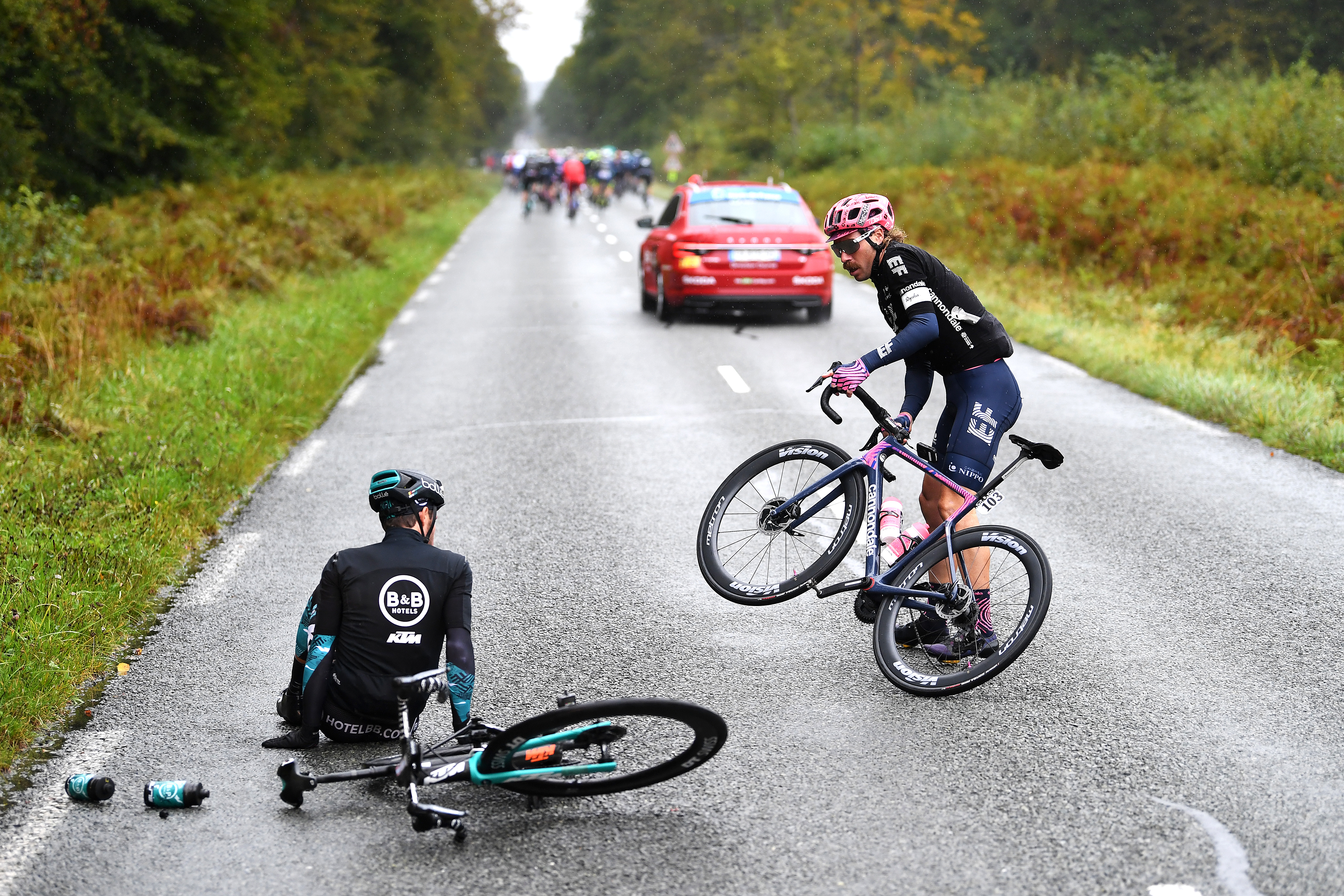Mitch Docker finishes career with a crash, a beer and a lift to the Roubaix velodrome
Retiring Australian tells the tale of his last Sunday in hell, with Paris-Roubaix delivering an unexpected end to a 13 year career

A big stark DNF may be what sits on the results page for Paris-Roubaix, the last race of Mitch Docker’s career. But as often is the case, there’s more to the story than those three letters recorded on the page. In fact, it seems somewhat of a fitting end to a 13-year cycling career where individual results often didn't reflect the value of the ride or tell the true tale of the race.
The 35 year-old Australian – who started racing in Europe with Skil-Shimano, shifted to Orica GreenEdge and then finished his time in the pink jersey of EF Education-Nippo – spent most of his career working as a domestique, boosting the results of his teammates, not his own.
When Paris-Roubaix was shifted to autumn, it seemed the ideal way for the experienced cobbled Classics rider to wrap up that career, riding into the celebrated velodrome one last time.
However a broken elbow at the Benelux Tour just a month before Paris-Roubaix and a steadily diminishing appetite for risk somewhat eroded his enthusiasm.
“Over the last few days I’ve progressively got less excited about it and more nervous about it, especially with the weather,” said Docker the night before the race, while chronicling his last week as a professional cyclist for his regular Life in the Peloton podcast.
“I keep telling myself don’t worry about it, don’t stress too much but naturally I am stressing about it. I am nervous about it. I’m scared actually. I’m scared about the wet cobbles. I want to finish, I want to close everything off perfectly but it’s not going to be like that. I think I need to realise that.”
Docker's aim, who was lining up for his 11th Paris-Roubaix and had finished as high as 15th, was simply to make it to the velodrome.
The latest race content, interviews, features, reviews and expert buying guides, direct to your inbox!
“For me it's always been about trying to get in on time and of course that’s going to be a goal again,” said Docker at the start line.
“But I’m just going to try and get in, I want to get in and I hope there is nothing that restricts me from riding it out. That’s all I hope for.”
Barely off the line, a crash and the goal post changed.
“I was so nervous at the start. I think that had something to do with me crashing … and I sat at the back pretty much the whole way from there to the first sector,” said Docker in the Life in the Peloton podcast.
“We hit the first sector and once the race got away and I had a bit of space I started to find my groove, but I didn’t love it. It was muddy and it was hell out there and I realised at that moment I had wanted to fight on to the velodrome today but not like this. Is it worth pushing onto the velodrome alone out the back one hour behind just to prove that I got to the velodrome?”
What he did think was worth it, though, was making it through the pavé of the Arenberg forest, where his fan club had lined the road on the lead in with his name.
“I soldiered on to Arenberg, saw my name there, it inspired me for that first 500 metres until the reality of Arenberg set in," said Docker. "It’s brutal across there and I’m glad I got to experience that final brutalness of Arenberg and to feel it and hate it.”
“I was lucky enough at the end of that to spot a Life in the Peloton cap, two Life in the Peloton caps and I yelled out ’hey boys, you want to drive me to the velodrome’ and they didn’t think I was serious, until I actually confirmed that I was. We went back, we jumped in the car, cracked a beer and the next thing I knew was that it was a blessing in disguise. It was like this was meant to be. I wasn’t riding in some foreign team car in a misery moment. I was immediately feeling relief from the race and immediately in this great spot, this transitional phase.”
That makes Paris-Roubaix the race where – regardless of the DNF on the sheet – Docker took a big individual result, that of being able to choose to step off the bike and call an end to a long career knowing the time was right.
“This is just not my place anymore," said Docker.
"You need to be out here fearless, you don’t need to be stupid but you need to be fearless and you need to go into those corners and make calculated risks and not think about risk but think about what you need to do and move through the peloton, flowing through as opposed to fighting the grain and that’s what I felt like I was doing the last few races of my career.”
“I knew what to do, I knew where I needed to be but it was like I was pushing against the grain to get there. That’s a very hard way to do it, I can tell you. Physically it’s very hard and mentally you are sort of fighting yourself the whole day. You can probably see where I was at by the time I climbed off at Arenberg. It was just like, beautiful. It was a great experience but it was just time.”

Simone is a degree-qualified journalist that has accumulated decades of wide-ranging experience while working across a variety of leading media organisations. She joined Cyclingnews as a Production Editor at the start of the 2021 season and has now moved into the role of Australia Editor. Previously she worked as a freelance writer, Australian Editor at Ella CyclingTips and as a correspondent for Reuters and Bloomberg. Cycling was initially purely a leisure pursuit for Simone, who started out as a business journalist, but in 2015 her career focus also shifted to the sport.